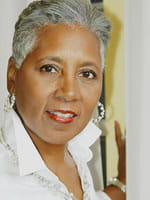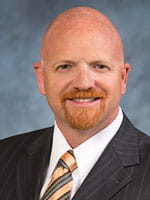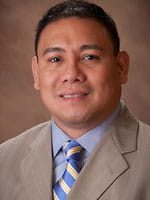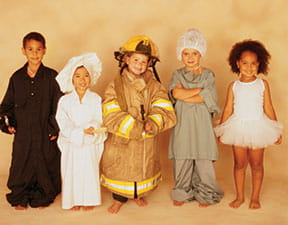Inspire children to find fulfilling professions.
What did you want to be when you were a child? Did you receive support and encouragement from your parents, grandparents, or teachers to figure out what you wanted to do? How do you plan to prepare your children? The answers to these questions may not be easy—it may have taken decades (and plenty of education) for you to find the perfect career, but it’s possible to pave a smoother road for your children. Here, three alumni share the winding paths they took to their current careers and offer advice to help you start career-oriented conversations with your children.
The Advocate

Sheila L. Agnew McCoy
Sheila L. Agnew McCoy ’10
MBA Graduate
Childhood Dream: Business Owner
Current Position: Entrepreneur and Author
The black stripes the 15-year-old girl had painted on her bedroom wall were precise—straight, with no wobbly edges, and evenly spaced. Sheila L. Agnew McCoy proudly surveyed her work while her mother tried not to blow her stack.
Once McCoy’s mother calmed down, she realized that the unauthorized Foot Locker-like decor was actually pretty spectacular, especially for a teenager. So she congratulated her daughter and showed off the handiwork to anyone who visited the house.
This was a telling moment in McCoy’s life, hinting at what she would do when she grew up: do things her own way, take risks, and help others find their own passion while giving them the kind of support and advice she got from her family.
McCoy is now a successful author, mentor, and peer coach in Atlanta. She also serves as the local chapter director for Over 40 Females Inc., where she manages monthly networking events and presentations that are designed to connect, encourage, and inspire women. “It makes me feel good to help people live their passions,” she says.
McCoy wasn’t the type of child who knew exactly what she wanted to be when she grew up. She studied creative writing in junior college, but when she saw a billboard advertising an entrepreneurship class at the local Chamber of Commerce, she decided she wanted to start her own business. So McCoy transferred to Chicago State University and majored in business administration.
Her first post-graduate job was in human resources, but she had the entrepreneurial bug, so she put together a business plan and within a year opened a party supply store in Chicago. “I started out selling retail party goods, but when I expanded the business to decorating and event planning, it took me across the country to plan events for corporations,” she says.
After five years, she transformed her business, leaving retail to focus on event planning and decorating. When a client asked her to set up and manage booths at trade shows that focused on women, “I had an aha moment,” McCoy says. “Not every city has a major event with a focus on women’s issues.”
Her trade show experiences prompted her to fill a business niche by developing a women’s expo in Columbus, Ohio, that focused on self-development for women through education, health, and economic and cultural awareness.
The program was a success, and it showed McCoy that one of her greatest talents lay in helping women find their way in professional and personal endeavors. She thought an M.B.A. with a focus on leadership might make her a stronger coach, so she enrolled at Walden.
“When I graduated from college, I said I’d never go back to school,” McCoy says. “Never say never!” She was particularly influenced by the international students she met. “I’ve worked by myself or with a limited staff since I started my own business. The program allowed me to see what people are doing in business around the world, whether it’s at a corporation or a small business,” she says. “I also led a lot of group projects, so what I learned also put me in a strong leadership position.”
Since launching her business in Chicago, she’s moved to Atlanta, where she’s re-established the company and published two books. Her latest, Dear ______, Are You Missing Your Calling? (Mo Better Publishing, 2013) helps readers uncover their talents and find motivation to pursue their passions.
“I am inspired by those who benefit from my coaching or writing,” she says. “The realization that I have gifts and talents that encourage others makes me passionate about my work. Being a mentor came naturally. I started doing it because it was the right thing to do, but it became the most important thing for me to do—to give back.”
The Patient Professional

Michael Jongsma
Michael Jongsma ’11
MSN Graduate and DNP Student
Childhood Dream: Fireman
Current Position: Chief Nursing Officer
When Michael Jongsma was a boy, he sat inside his Uncle Steve’s fire truck and imagined what it would be like to be a hero. But even then he took a realistic approach to dreaming about the future; he knew it would take more than just donning the hat and boots to become a firefighter.
Jongsma knows that instant gratification is rarely possible in a career. It’s necessary to pay dues and rise in the ranks. This approach has served him well and allowed him to land his dream job as chief nursing officer (CNO) for Providence Little Company of Mary Medical Center in Torrance, California, a 436-bed medical center where he leads 750 nurses.“My passion is learning and developing. I never say ‘no’ to anything,” Jongsma says. “My approach has opened doors.”
After high school, Jongsma wanted to train to become a firefighter, but he needed financial stability, so he became a Honda mechanic, then bused tables at a local restaurant—where he worked his way up to manager. The job didn’t seem to dovetail with his larger dreams, but he saw its universal lessons. “I developed a real sense of leadership in that role,” he says.
When he left the restaurant business to become an EMT, he thought the switch would put him on the path to becoming a firefighter. He loved the work, even the hours—from 2 p.m. to 2 a.m. or 7 p.m. to 7 a.m.—and held on to the job for 12 years. “It was so gratifying to save lives and affect the community in such a dynamic way all while learning new things,” he says.
In 1999, Jongsma accepted a position as an emergency medical technician at Providence. The emergency department nurses thought he had what it took to be one of them, but at the time he wasn’t so keen on going back to school. “I hadn’t realized how important education really is,” he says. “But when I saw how fulfilling it was to focus on patients and my fellow staff and found my passion for healthcare, I knew I needed to go to school to excel. I was determined to succeed.”
He finished his associate and then his bachelor’s before enrolling in the MSN program at Walden. In 2007, his hard work paid off. He was promoted to director of nursing for cardiovascular services at Providence. And he is determined to continue improving. Even though he was recently named CNO, he’s now pursuing his DNP—his goals as a lifelong learner haven’t changed despite his new role and responsibilities.
Jongsma does not wonder why it took so long to end up in this leadership role. “Climbing ladders quickly is exciting and rewarding, but it can require a lot of personal sacrifices and may mean you’re unhappy in a role you fought so hard to get,” he says. “Titles and ranks are meaningless to me. What matters is giving my all and helping others. That’s led to my success and my personal and professional satisfaction. I hope I’m able to mentor many people who go on to accept additional responsibilities and leadership roles so they too can positively impact others.”
The Shape-Shifter

Dr. Edilberto A. Raynes
Dr. Edilberto A. Raynes ’13
PhD in Public Health Graduate
Childhood Dream: Actor
Current Position: Associate Professor
When his parents asked him what he wanted to be when he grew up, 12-year-old Dr. Edilberto A. Raynes said he wanted to go into theater. This answer gave them great pause. Next, they asked him two questions that would help set the course for his career: “Will you be able to feed your family well if you choose that career? Is family important to you?”
After months of hard thinking, Raynes knew he had to pursue the answers. In high school, he took an aptitude test and found he was suited for a career in health sciences, and he eventually pursued a bachelor’s in psychology with a long-term plan to pursue medicine.
Then his mother was diagnosed with a terminal illness when he was 20 years old. Raynes stayed by her bedside, caring for her in her final days. “It’s as if she was grooming me to be in medicine,” he says. “That’s when I decided to be a doctor. I wanted to serve people in my community.”
Raynes enrolled in a medical school in the Philippines with a vision that matched his focus on serving the underserved in his native country. While there, he worked in remote areas, engaging the community by facilitating self-reliance workshops, establishing a small pharmacy, and conducting prevention seminars. After graduation, he took a residency in pediatrics, where the department chair groomed him to serve as chief resident.
When Raynes fell in love and got engaged, his fiancée, Invie, received a job offer in the U.S. as a physical therapist. Five days after their wedding, she left the Philippines. They lived apart for the first few months of their marriage—until she called to say she was pregnant.
“I followed her there in July of 1996,” he says. “And I wasn’t licensed to practice medicine in America.” He assessed challenging the United States Medical Licensing Examination, but he needed to help support his growing family, so he took a position as a phlebotomist for two years. “I swallowed my pride,” he says. “My wife told me to go back to my career, my dreams, my ambitions, but the fees for the licensing exams are not cheap, and I wondered what I would do if I failed.” After careful thought, he decided to become a teacher.
So Raynes opened the phone book and called local colleges to see if he could teach. A junior college in Nashville, Tennessee, invited him to lead classes in anatomy and physiology for medical assistants. One of his students from the junior college recommended him to her mother who works as an administrative assistant at Tennessee State University (TSU). He was offered an adjunct faculty position, which later became a permanent part-time position. After three years in this capacity, he was offered a full-time, tenure- track assistant professor position at TSU with the stipulation that he had to pursue a terminal degree to be eligible to apply for tenure and promotion. So in December 2007, he pursued his Ph.D. in Public Health at Walden.
While he may not be an actor or a practicing medical doctor, his current career as a tenured professor feels like the perfect fit. Not only does it allow him to share the lessons he’s learned with students, it also introduces opportunities to collaborate, publish, and present his research—which are his passions. “If you have an opportunity, grab it,” Raynes says. “It may not be the one you thought you wanted, but if you don’t apply, you won’t know.”
Help Children Choose a Career

Photo credit: Valerie Simmons
What do you want to be when you grow up? It’s an age-old question and one that inspires responses both realistic and fantastical (“A police officer! No, a clown! No, a unicorn-wrangler!”). But the answers can provide a glimpse of what your children (or students) might want in the future. Listening to their ideas, encouraging, and gently steering them in the right direction will be challenging and extremely rewarding. Here are some tips to help your kids take their first steps down a satisfying career path:
PINPOINT POSSIBLE PASSIONS. Talk to children about what they like to do, says Sheila L. Agnew McCoy. Ask: What is your favorite part of the school day? What do you like the least? What do you most look forward to every day? “I see too many parents trying to get their kids interested in the things they want them to do,” she says. “Focus on developing their skills, talents, and gifts and then see what they might be suited to do.”
GET OUT THERE. If a child wants to run an art gallery, take her to galleries and see if she can talk to the managers and curators. Enroll her in classes, attend workshops, and give her a taste of what her real-life experience might be like if she chooses this career.
FIND PROFESSIONAL MENTORS. If you’re not familiar with the careers your children want to pursue, help them find good role models in that particular field. Talk to your family members and colleagues to start or look for people willing to help within your community. A one-hour visit could turn into an ongoing mentorship for your child.
EMBRACE CHANGE. “You have to recognize that kids change a lot,” McCoy says. One day a child might want to be an astronaut, then an accountant. Help her keep an open mind and look for threads that connect seemingly disparate ideas.
ENCOURAGE YOUR CHILDREN TO TRY. You never know what they’ll learn or the connections they’ll make. Tell your kids to grab opportunities when they arise, says Dr. Edilberto A. Raynes. When a volunteering opportunity or part-time job arises, encourage them to seize it.
TAKE A TEAM APPROACH. “Spend time with your kids. Have family night,” Michael Jongsma says. “Make the family your number one team and work together to encourage your children to do whatever they put their minds to.”



